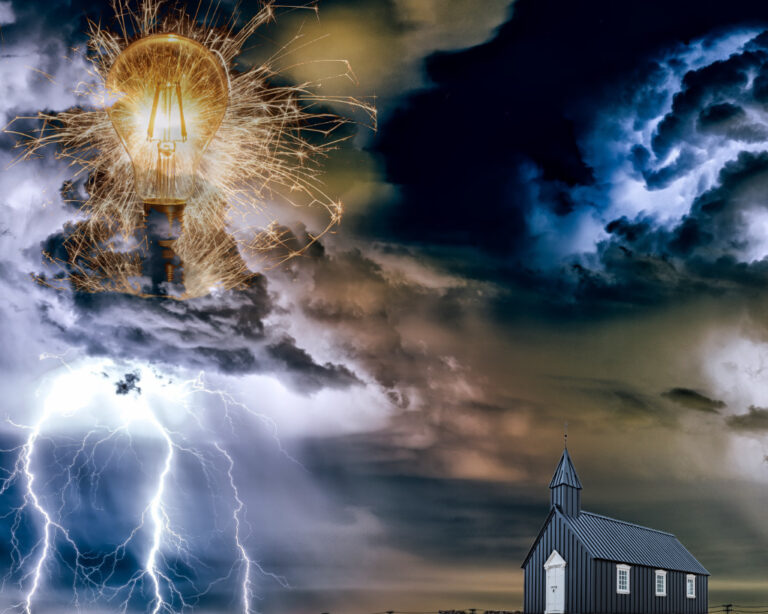 Russell Moore writes in the Atlantic that American evangelicalism is in crisis. There is a Faustian pact of unholy MAGA politics, conspiracy theories, and religious feelings that can only be remedied with a revival of the faith itself, laser-focused on Moore’s conceptions of what Christianity should strive to become. He acknowledges that there is a dark history to America’s evangelical movement through the 20th century. It was always political in close focus, with the maintenance of racism and exclusion at its core well before abortion was even a talking point. Anti-Catholicism and antisemitism were equally bundled up with the evangelical mindset. Beyond the moral failings that sloshed into politics, there was the structural marketing of the faith by televangelists and traveling ministries that turned the hoped-for internal conversion into a more cynical plot:
Russell Moore writes in the Atlantic that American evangelicalism is in crisis. There is a Faustian pact of unholy MAGA politics, conspiracy theories, and religious feelings that can only be remedied with a revival of the faith itself, laser-focused on Moore’s conceptions of what Christianity should strive to become. He acknowledges that there is a dark history to America’s evangelical movement through the 20th century. It was always political in close focus, with the maintenance of racism and exclusion at its core well before abortion was even a talking point. Anti-Catholicism and antisemitism were equally bundled up with the evangelical mindset. Beyond the moral failings that sloshed into politics, there was the structural marketing of the faith by televangelists and traveling ministries that turned the hoped-for internal conversion into a more cynical plot:
In the end, a market-driven religion gives rise to a market-driven approach to truth, and this development ultimately eviscerated conservative Christianity in the US and left it the possession of hypocrites and hucksters.
I’m not at all surprised. As information has become unlocked from the vaults of academic pursuits by modern technologies, the ripples of uncertainty about faith claims have spread and clashed with the desire to totalize the political, personal, pragmatic, and moral dimensions of evangelical beliefs. If a thing is so unquestionably right and good, it must infiltrate and own the mind, the body, the soul, the community, and the nation. So why is the world drifting away, seemingly inexorably?
But even those who leave their faith communities feel adrift, clinging to vague spirituality or buffet gorging across traditions in search of something that is satisfactory but different. But that is only in the best of moments, when a song triggers nostalgia or late after eggnog on Christmas Eve. Ordinary days are locked to work, family, shopping, and the management of living. Most days are purely secular and the nostalgia fades to a longing for the community that once felt like a warm home.
What is needed is a new approach to the desire for a numinous dimension to our lives. There should be no mystery inherent in it other than the spectacular mystery of life itself. To do otherwise is to invite the unraveling of the systems and beliefs by critical minds who see into the cracks that nonsense surely engenders—a fate of all the popular traditions. There should be community that supports and enervates the system, providing for life transitions and motivating personal achievement in pursuit of a common good. There should be a moral framework that values truth and equanimity in gauging and understanding ethical challenges. There should be an acceptance and encouragement of other faith traditions as leading by contrasts and failures to this new approach. The system should free the adherent from inflexible dogma and a resistance to change by encouraging a constant refinement of the belief framework while maintaining the commitment to core principles that celebrate maximizing our potentials. It shouldn’t be built on tokenized foreign concepts that are alluring in their impenetrability, thus smuggling in unknowability to provide a mysterious undercurrent. Gurus and hucksterism must not be allowed, while personal spiritual achievements and contributions to society must be celebrated.
It is almost enough to merely reflect on science, history, governance, technological change, economic advancement, medicine, and the arts. There is enough magic in all of those to provide that enervating glimpse of the holy machinery of life cradled in complex social orders. But there is a lack of institutional coordination beyond the professional scaffolding of each area. Celebrating them is through an award or prize now and again, and through professional advancement and accolades. Forming a numinous tradition around them, with sacraments and rituals and churches requires something altogether new.
But even thinking about the form a better tradition might take, by contrasts and failures, and then hope and awe, builds us towards that central idea. What is good and brings about thriving? What decisions can be converted into new action and effort towards expanding the edges of our understanding? Even without a church—yet—we are in a nexus of potentiality.
Edits!
Changed spelling of antisemitism to match NYT convention